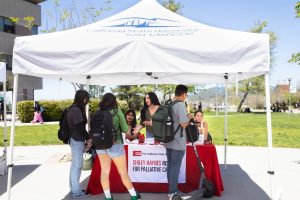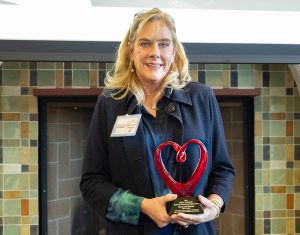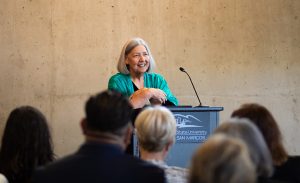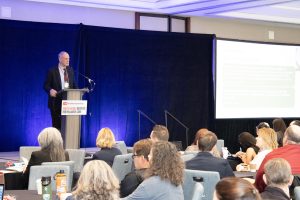Palliative Care, Community, and the Need to Think Differently
Palliative Care education for the community is a key area of focus for the CSU Shiley Haynes Institute for Palliative Care. Patients won’t ask for palliative care if they don’t know what it is. Consequently, the Institute engages in a number of activities to move beyond higher education campuses and into the communities that surround us. Spring 2024 has been a very active time for this community-focused work.
What Gives Your Life Meaning (WYGYLM?) Resource Fair

CSUSM’s campus partner office hosted the annual What Gives Your Life Meaning (WYGYLM?) spring resource fair on April 16th, National Health Care Decisions Day. They brought multiple community agencies to the campus, including the San Diego Coalition for Compassionate Care and the Elizabeth Hospice, so that they could engage with students, staff, and faculty. The goal was to emphasize the need for all of us to have those important conversations we all need to have about our healthcare wishes. Importantly, they stressed the need to share those wishes with loved ones, and to record them in advance directives. I used to hear comments from people asking, “Why is it necessary to share this message with college students? After all, they are so young.” Recent research shows that approximately 25% of college students are caring for loved ones; many students have their own health issues, as well. We NEED to talk with them. Covid reminded us that even the young need to have these conversations and think about who it is that they want to speak for them when they can’t speak for themselves. We applaud the work of the campus partner office at CSUSM in its community-focused commitment to ensure that each of us reflects on our healthcare values and shares those values with the important people in our lives.
Marycarol Reeder Receives the The Doris A. Howell Award

Another event held on National Health Care Decision Day allowed us to celebrate with our community through our Howell Award reception. The Doris A. Howell Award for Advancing Palliative Care is presented annually to a palliative care champion in San Diego County. This year’s recipient was Marycarol Reeder, the Integrations Director for Scripps Health in La Jolla. Marycarol was joined by family members, colleagues, and friends, for a celebration that was held in the McMahon House at CSUSM.
We were honored to have Darlene Shiley in attendance that night, a palliative care champion in her own right. She shared her personal palliative care story, offering insights into why she has been such a stalwart supporter of providing this education and of the work of the CSU Shiley Haynes Institute for Palliative Care.
$25,000 Gift for Pathways Program at Hospice of the North Coast

A highlight of the evening was the presentation of the $25,000 gift in Howell’s honor to the Pathways Program at Hospice of the North Coast. Award recipients choose a San Diego organization that is making a difference in palliative care. This year, Marycarol selected the Pathways program to receive the funds generously provided by Darlene Shiley. These funds will go a long way to support the phenomenal work being done by the hospice as they provide much-needed home-based services palliative care to patients and their families.
2024 National Symposium for Academic Palliative Care Education and Research

A major professional community event was our National Symposium for Academic Palliative Care Education and Research held at the Hyatt Regency Mission Bay in February. We enjoyed three days of learning and sharing; a common theme throughout was how best to engage with the people in our communities who need palliative care services. We are indebted to our distinguished plenary speakers, Dr. George Fitchett, Dr. Melinda Kavanaugh, Dr. Karl Steinberg and Dr. Ann Berger, in addition to our outstanding presenters, for providing such a deeply engaging program from the perspectives of multiple disciplines. We hope that you will join us next year for the 2025 symposium, June 2nd through 4th, in the beautiful conference facility at California State University San Marcos, San Marcos, CA.
Speaking to Future Healthcare Providers
Finally, spring community education activities included an invitation I received to speak with future healthcare providers. I had the pleasure of meeting with the Young Leaders in healthcare club at La Costa Canyon high school in San Diego County. They had selected palliative care as their final research project; the students wanted to explore what palliative care offered patients and families. There is nothing like interacting with young people who have passion – and every one of the students I met wanted to serve others as doctors, nurses, physical therapists and other healthcare professionals. The message of providing care that reduces symptoms, acknowledges the whole person, and improves quality of life resonated with the group. One student walked me out to the parking lot after the discussion and asked me a great question. “I think that working in a palliative care team is a great idea but how could you ever have enough teams to meet patients’ needs?” She asked a question that we should all be considering. How can we make palliative care available under the current model of limited specialized teams? The answer is that we can’t. We’ve got to think differently about ensuring that all healthcare professionals have this training.
Thinking Differently About Palliative Care
Thinking differently means that in addition to training new healthcare professionals in palliative care, we need to ensure that the teams that we currently have in place are supported and that their numbers grow. Too often these teams are seen as expendable, and the first to be trimmed or let go when funding gets tight. We need to change our thinking. We need significant efforts focused on alternative funding models that do not solely rely on fee-for-service to support palliative care. We need to identify opportunities to integrate palliative care services in innovative ways, such as the Guiding an Improved Dementia Experience (GUIDE) model currently being piloted by the Centers for Medicare & Medicaid Services. And we need to join together, collaborate on these goals, and move us all closer to getting the kind of whole person, high quality health care that we all want and deserve.




